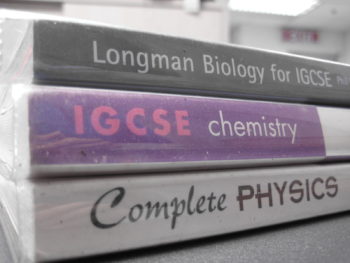
Photo courtesy Wenday on Flickr, Creative Commons
Textbooks are expensive. Long gone are the carefree days in public school when books were provided in class. In college, you need to find your own. Sometimes one needs to purchase a gigantic, heavily-bound tome, but it is not unusual to have to buy a bundle of loose pages sealed in cling wrap for around a hundred dollars.
“I had to drop a class because I couldn’t afford both (the tuition and the book),” says Eli Snyder, who pays for school out of pocket.
Other students think the cost is justifiable.
“They’re a little expensive but I think it’s a happy median,” says student Mariah Pitcher.
So where does all that cost come from? Who decides which books we will be required to buy?
DMACC doesn’t own the bookstores on its campuses. They are owned by a company called Follett, which is on Forbes list of one of the largest privately owned companies in the United States.
According to Lori Richards, manager of the DMACC Ankeny campus bookstore, Follett governs the cost of books, though it is also influenced by the individual publishers. DMACC instructors and professors have some control in that they request the books for their classes based on the inventory available from Follett. They occasionally have the option to select only a few chapters out of a larger book, tailoring a book to their specific class. This may make it cheaper, but it also means that the book will only be available from DMACC bookstores.
Something that is happening more and more frequently with textbooks now is the addition of an online portion to the book, accessible via a code inside the book. Some textbooks come with the code, and some do not.
If the professor doesn’t want to use the online portion, theoretically they can request that the students purchase the book without the code.
Quian Moss, professor of biology at DMACC, will not be using the online portion of her requested book. Somehow, her students were asked to buy the book with the online portion instead of the one without.
She has been assured by her district chair that the difference between the two versions is negligible.
According to Quian, he said that “…there is none or very little difference on the price.” Also, the book request has been altered for future classes. Book only, no online portion.
However, some DMACC students are finding more issues with the online portions. Student Cole Reels says he paid $235 for a textbook with the online portion, and never used the book. He wishes he could have purchased the online portion separately, since it was the only part he used for that particular class.
One student says he opts out of purchasing books altogether, finding pirated PDF’s of the books online and using those instead.
Spanish Professor Stacy Amling said the book for her class costs $300. She says she believes the cost is justifiable for a five-credit class which lasts two semesters.
She says she likes that the book with online access gives students exposure to many skills and resources.
Having one excellent book used for all the sections keeps the classes consistent throughout teachers and campuses, and protects them from copyright infringement. Her department has considered one less expensive book but she just doesn’t like it as well as the pricier one.
Journalism professor and Boone Banner adviser Julie Roosa says she does take cost into consideration when selecting a book.
“So much of the learning in my classes is done ‘outside of the book,’ meaning I use the text as a supplement rather than primary material,” says Roosa via e-mail.





Comments